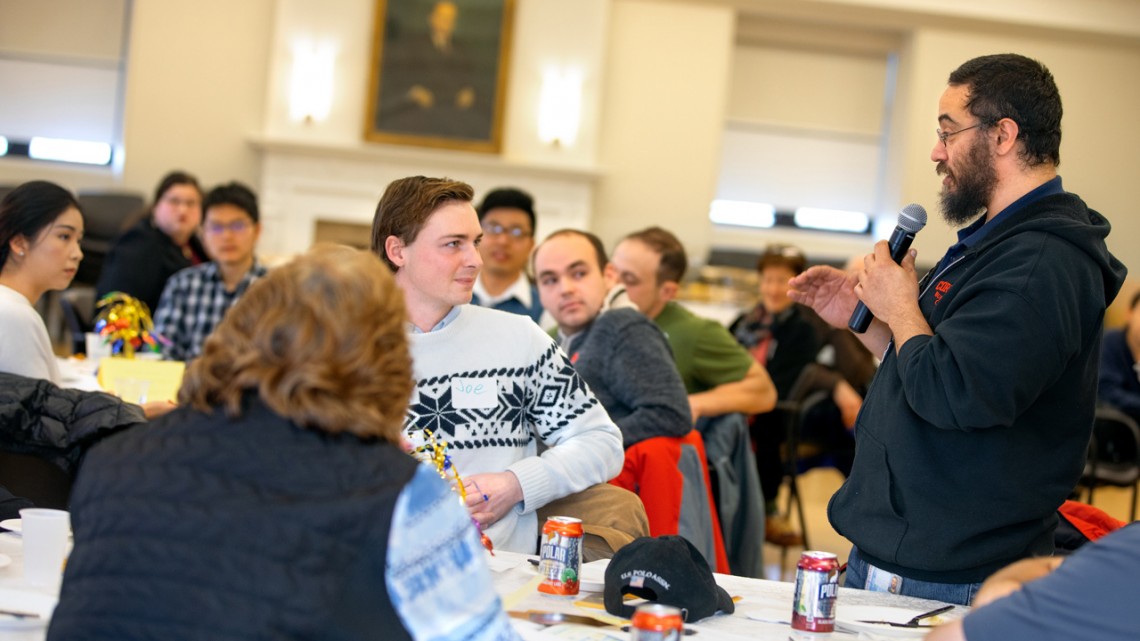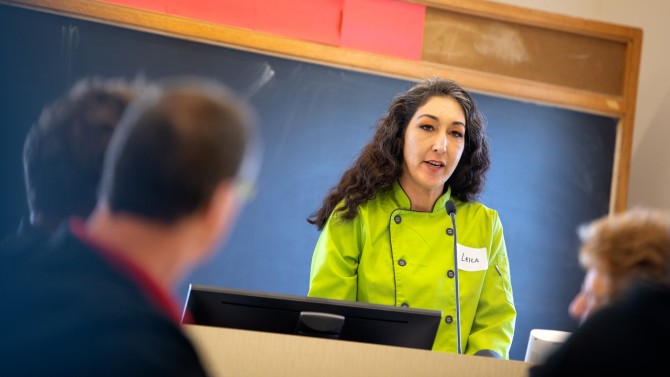
Paul Cortez, right, an employee with facilities services, speaks about his learning partnership experience with Joe Thorsrud ’20, center, at the Dec. 12 CLASP luncheon.
CLASP participants connect through lifelong learning
By Joe Wilensky
Participants in the Community Learning and Service Partnership (CLASP) program not only have developed new skills through their semesterlong learning partnerships, they have developed friendships and deeper understandings about themselves and each other.
Staff members who paired with student mentors for the fall semester attended a Dec. 12 luncheon in Warren Hall for a “midyear celebration of learning” at which they thanked their mentors and spoke briefly about their learning partnerships. The students also offered their thoughts about the experiences and what they learned from their partners as well.
This semester’s 27 partnerships explored learning photography and video editing skills, Microsoft Excel, writing a professional resume, how to create a budget for planning the ingredients for a restaurant meal and more.
Sasha Endo, CLASP’s program liaison, described her own job history, which took her from teaching students in an inner-city school in Philadelphia and a school in Ecuador to working as a dishwasher in a Connecticut restaurant before coming to Ithaca to work at Tompkins-Seneca-Tioga BOCES and then Cornell. She said what she realized is that while all her co-workers, students and their families have had essentially the same levels of intelligence and talent, they have had very different levels of access to education and learning opportunities throughout their lives.
CLASP seeks to expand and extend lifelong learning opportunities to Cornell staff throughout their careers, Endo said. And, she noted, in addition to the skills and relationships participants developed, all program participants come away from the experience with something else just as important.
“What if we took the judgment out of looking at someone’s job or their diploma, and stop assuming that those things told us the whole picture of that person?” she said. “Based on our own experiences here, getting to know different people in CLASP, we have committed to learning about ourselves more, and about each other more, in order to stop making assumptions about people that we don’t know based on their uniform or what they’re wearing.”
Endo introduced Leila Ellis, who cooks for Cornell Dining at the halal station at North Star in Appel Commons, and is “the person whose learning has really exemplified that the most of anyone I’ve met,” Endo said.
Ellis noted that unlike many of the dining stations throughout campus, her job has her plating and serving dishes directly to students.
“Whereas the other stations are self-serve, we serve each person face to face,” Ellis said. “That really brings a more personal experience to eating.”
Ellis partnered with Veronika Drozdova ’20 to learn more about the halal diet and its layered meanings.
“Even though I’m not Muslim, to me halal means to be conscious of all the food products I consume … that they are natural, organic, and that they are lawfully acquired, raised humanely, resourced ethically and brought to market without poisonous toxins and chemicals,” she said.
Ellis said that through the one-on-one learning relationship she developed through CLASP and with Drozdova, she discovered something even more profound.
“I believed from a young age that being smart and being able to learn was something that was inherited – you were born with the ability to be smart or you weren’t,” she said. “I’m now learning that this is the furthest thing from the truth. … we’re here to help one another. We feed you through this challenging and rewarding experience.
“Through CLASP, we have come to understand more about [ourselves] as people and each other’s humanity. Why does this matter? Because it allows us to learn and grow together,” she said, explaining that this goes to the heart of university founder Ezra Cornell’s original mission of “any person … any study.”
“Education is what makes us fully human,” Ellis said, adding that she also understands that “fear is part of learning, and that’s OK.”
CLASP director Annalisa Raymer noted that it was the anniversary week of the Universal Declaration of Human Rights, which was adopted by the United Nations General Assembly in December 1948. An abridged copy was on each table. “Everyone has the right to education” is one of its articles, and today, the U.N. Sustainable Development Goals 2030, adopted in 2015, include ensuring the promotion of lifelong learning opportunities for all.
“We’re at a point again in history when we need to think about international cooperation, and how we can create conditions for all of us to thrive,” Raymer said. “Lifelong learning isn’t only fun, but it requires critical thinking, innovative thinking and problem-solving, at the local level and at larger levels.
“So I thank you,” she said, “for being the kind of people who are engaged in learning, keeping your curiosity alive, keeping your willingness to work with others alive, so that learning together, we can learn our way to a better, more sustainable world.”
Media Contact
Get Cornell news delivered right to your inbox.
Subscribe

